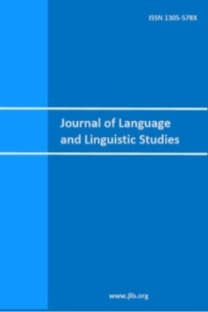Refusal production via dct and role play
Interlanguage pragmatics, DCT, Role plays, Refusals
___
Arnándiz, O. M., Espurz, V. C., & Campillo, P. S. (2012). Measuring pragmatic knowledge: Have written and oral DCTs outlived their usefulness?. In Empiricism and analytical tools for 21 Century applied linguistics: selected papers from the XXIX International Conference of the Spanish Association of Applied Linguistics (AESLA) (Vol. 185, p. 77). Ediciones Universidad de Salamanca.Bardovi‐Harlig, K. (1999). Exploring the interlanguage of interlanguage pragmatics: A research agenda for acquisitional pragmatics. Language learning, 49(4), 677-713.
Beebe, L. M. & Cummings, M. C. (2006). Natural speech act data versus written questionnaire data: How data collection method affects speech act performance. In S. M. Gass & J. Neu (Eds.), Speech acts across cultures: Challenges to communication in a second language, (pp. 65-86). New York: Mouton De Gruyter.
Blum-Kulka, S., & Olshtain, E. (1984). Requests and apologies: A cross-cultural study of speech act realization patterns (CCSARP). Applied linguistics, 5(3), 196-213.
Brown, P. & Levinson, S. C. (1987). Politeness: Some universals in language usage. Cambridge: Cambridge University Press.
Cohen, A. D. (2005). Strategies for learning and performing L2 speech acts. Intercultural pragmatics, 2(3), 275-301.
Felix-Brasdefer, J. C. (2004). Interlanguage refusals: Linguistic politeness and length of residence in the target community. Language Learning, 54, 587-653.
Félix-Brasdefer, J. C. (2010). Data collection methods in speech act performance: DCTS, role plays, and verbal reports. In A. M. Flor & E.
Uso-Juan (Eds.). Speech act performance: Theoretical, empirical, and methodological issues (pp. 41-56). Amsterdam: John Benjamin’s Publishing Company.
García, C. (1996). Teaching speech act performance: Declining an invitation. Hispania, 79, 267-279.
Golato, A. (2003). Studying compliment responses: A comparison of DCTs and recordings of naturally occurring talk. Applied Linguistics, 24, 90-121.
Hartford, B.S. & Bardovi-Harlig, K. (1992). Experimental and observational data in the study of interlanguage pragmatics. Pragmatics and Language Learning, 3, 33-52.
Jorda, MPS. (2007). Pragmatic production of third language learners: A focus on request external modification items. In E. A. Soler & M. P. S. Jorda (Eds.). Intercultural language use and language learning (pp. 167-190). Dordrecht: Springer.
Kasper, G. (2000). Data collection in pragmatic research. In H. Spencer-Oatey (Ed.) Culturally speaking: Managing rapport through talk across cultures (pp. 316-341). New York: Continuum.
Kasper, G., & Dahl, M. (1991). Research methods in interlanguage pragmatics. Studies in Second Language Acquisition, 13, 215–247.
Lauper, J. A. (1997). Refusal Strategies of Native Spanish Speakers in Spanish and in English and of Native English Speakers in English. Paper presented at the Annual Meeting of the Teachers of English to Speakers of Other Languages, Orlando, FL.
Mathison, S. (1988). Why Triangulate?. Educational Researcher, 17, 13-17.
Nelson, G. L., Carson, J., Batal, M. A., & Bakary, W. E. (2002). Cross‐cultural pragmatics: Strategy use in Egyptian Arabic and American English refusals. Applied linguistics, 23(2), 163-189.
Roever, C. (2011). Testing of second language pragmatics: Past and future. Language Testing, 28(4), 463-481.
Rose, M. C. (2013). Pragmatic development of L2 Spanish proposals in planning talk. Unpublished doctorate thesis, Indiana University, Indiana.
Rose, K. R. (2009). Interlanguage pragmatic development in Hong Kong, phase 2. Journal of Pragmatics, 41, 2345-2364.
Sadler, R. W., & Eröz, B. (2002). "I refuse you!" An examination of English refusals by native speakers of English, lao, and Turkish. The Arizona Working Papers in Second Language Acquisition and Teaching, 9, 53-80.
Takahashi, S. (2010). The effect of pragmatic instruction on speech act performance. In A. Martinez-Flor & E. Uso-Juan (Eds.) Speech act performance: Theoretical, empirical and methodological issues, (pp. 127-144). Amsterdam: John Benjamins Publishing Company.
Takahashi, T., & Beebe, L. M. (1987). The development of pragmatic competence by Japanese learners of English. JALT Journal, 8, 131-155.
Wannaruk, A. (2008). Pragmatic transfer in Thai EFL refusals. Regional Language Center Journal, 39, 318-337.
- ISSN: 1305-578X
- Yayın Aralığı: Yılda 4 Sayı
- Yayıncı: Hacettepe Üniversitesi
Cognitive processing of second language idiom comprehension: A comparative study
English as medium of instruction and international posture: From the perspective of students
Student perceptions of difficulties in second language writing
Hasan Çağlar BASOL, Galip KARTAL
Evaluation of an English preparatory program at a Turkish foundation university
Intangible cultural heritage elements in the visuals of 6th grade Turkish textbook
